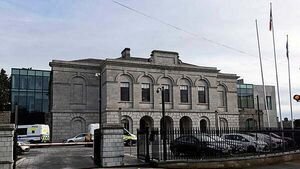'Horrible and disgusting': Man jailed for sexual abuse of his niece in the 90s

Tom Tuite
An uncle convicted of child sexual abuse of his “favourite” niece in the 1990s, leaving her suffering decades of trauma and family isolation, has been jailed for three years.
“You are the most horrible and disgusting man I have ever endured. The pain you put me through; I was blackmailed to keep it quiet, sure I wasn’t to know any different,” Helena Flynn, 42, told her abuser.
Mark O’Neill, 58, from Battery Heights, Athlone, and recently of Belvedere Court, Mullingar, both in Co Westmeath, was aged 23 to 25 years, and Ms Flynn, who has waived her right to anonymity, was aged eight to 10 years at the time of the abuse.
He had denied the allegations, but a jury at Mullingar Circuit Criminal Court returned guilty verdicts on eight counts of sexually assaulting her between April 1991 and March 1993 at her childhood home in Athlone.
He was remanded in custody in May and faced sentencing on Monday before Judge Kenneth Connolly.
“I'm going to grab this new life of mine with both hands, enjoy all the years I’ve lost. It’s never too late. I came into court a victim and came out a survivor”, Ms Flynn told the court.
Detective Garda David Mead, with the Protective Services Unit for Westmeath and Meath, agreed with prosecutor Cathal Ó Braonáin BL, instructed by State solicitor Matt Shaw, that the accused often visited the complainant’s home.
Her mother and O’Neill were sisters, the court heard.
Former milkman O’Neill would watch horse racing with her stepfather and socialise with her mother.
The abuse happened when he stayed over three nights a week and slept on a spare bed in her room.
The court heard how he took her from her own bed and put her into the one he was using, with her back to his front.
The abuse involved him touching her vagina, rubbing his erect penis against her, attempting penetration of her vagina and anus, and ejaculation on her back. He also told her she would be “taken away” if she disclosed the abuse.
Judge Connolly noted that among the numerous aggravating factors, there was an element of grooming and that he had called her his favourite niece and would give her special treatment.
He also took into account the age disparity and the egregious breach of trust.
Preemptive strike
The court heard that when she confronted him in the late 1990s, telling him she would report him, he got in a “preemptive strike” by going to her mother first, saying she was telling lies about him.
The court heard her mother spoke to her, warning her that another family member would “stab her to death”, so she did not tell anyone.
As a child, she began self-harming by biting herself on her arms, leaving marks, and her mother and stepfather warned her to stop in case her school noticed.
In 2009, she moved to the North, and throughout her life had suffered severe effects, which led to multiple suicide attempts and having to seek counselling.
The maximum sentence for the offence at the time was five years, the judge pointed out, whereas if the same offence against a child occurred today, the crime would be punishable by a term of up to 14 years.
In a moving victim impact statement, Ms Flynn spoke out about the pain her uncle inflicted on her.
She recalled being unable to think straight as a girl, and her education suffered.
“You have broken a beautiful little girl, because you thought it was okay, because you kept probably thinking it wouldn’t come out. You have hurt me physically, mentally; my innocence was taken away by you."
Ms Flynn stressed the pain she suffered as a child when she always screamed inside, but it never came out, and she had to live through this nightmare.
“I can still hear the screams, the cries, terrified to sleep, as I knew what you were doing was wrong, the most horrific thing a baby girl had to deal with."
She revealed she resorted to self-harm to cope and said that her family disowned her for speaking the truth. Ms Flynn recounted how she spent years crying herself to sleep and not wanting to live, and suffered flashbacks, nightmares, and fear of men or leaving her house, and was still reeling.
She opened up about how she moved and locked herself away for 10 years and felt disgusting, while O’Neill lived a happy social life. She wanted to see him behind bars and hoped this case would encourage other victims to come forward.
The trial had heard evidence from one of her friends to whom Ms Flynn had made a complaint.
O’Neill was interviewed by gardaí for four hours, denied the charges, and still maintains his innocence.
He sat impassively during the sentence hearing, did not address the court, and showed no remorse.
Defence counsel Andrea Callan asked the judge to note her client had a history of mental health treatment since 2012, particularly for anxiety; he had cared for his sick father, helped his family with odd jobs, and had cooperated with the investigation.
O’Neill had three convictions from 1993: larceny, criminal damage, and driving without insurance, and had been jailed then for 12 months. However, the record was not deemed relevant.
The judge imposed a 42-month term, but taking into account that he had no further convictions since the time of the abuse, he suspended the final six months on condition that O’Neill does not reoffend within 12 months. Judge Connolly made a further direction that O’Neill must never contact Ms Flynn again or have any unsupervised contact with females under 18 for the rest of his life.
A probation report found he was a low risk of re-offending.
If you have been affected by any of the issues raised in this article, you can call the national 24-hour Rape Crisis Helpline at 1800-77 8888, access text service and webchat options at drcc.ie/services/helpline/ or visit Rape Crisis Help.
If you have been affected by any of the issues raised in this article, you can freephone the Samaritans 24 hours a day for confidential support at 116 123 or email jo@samaritans.org.
Alternatively, the contact information for a range of mental health supports is available at mentalhealthireland.ie/get-support.
In the case of an emergency, or if you or someone you know is at risk of suicide or self-harm, dial 999/112.




